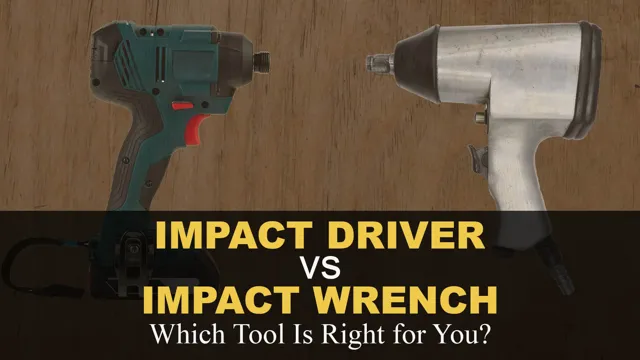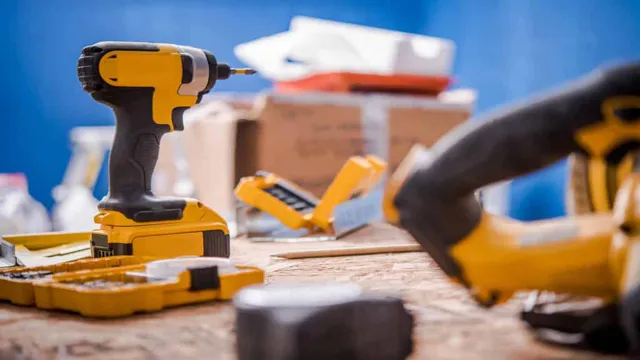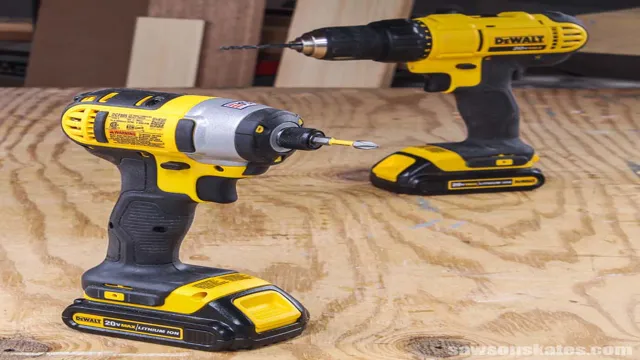Do I Need Special Bits for an Impact Driver? Essential Tips to Maximize Efficiency.

Do you love woodworking or DIY projects? If so, you’ve probably come across the term “impact driver” while browsing for tools. An impact driver is an essential tool to have around for any small to large woodworking or DIY job. But do you need special bits for an impact driver? The answer is simple: yes, you do.
Using the right bits is crucial to ensure the success of your project, but don’t worry, we’ll guide you through everything you need to know about bits for impact drivers. In this blog, we’ll explore the importance of using the right bits, the types of bits available, and offer some tips to make your next project a breeze. Let’s get started!
Understanding Impact Drivers
If you’re wondering whether or not you need special bits for an impact driver, the answer is yes. Impact drivers have a unique mechanism that produces a lot of torque, making them more powerful than regular drills. Standard drill bits are not designed to handle that level of force.
If you try to use a regular drill bit on an impact driver, it can easily break or fail. That’s why you need special bits that are specifically designed for use with impact drivers. These bits are made from tougher materials like high-speed steel or carbide, and they have a unique shape that helps them grip the screw and prevent slipping.
Using the right bits helps you get the most out of your impact driver and ensures that your projects are successful.
What Is an Impact Driver?
An impact driver tool is a powerful device that looks like a drill but works quite differently. It is designed to provide a high-torque output with less effort from the user and can tighten or loosen screws and bolts faster than other tools. Unlike a regular drill, impact drivers implement rotational force with concussive blows, which makes it easy to work with even the toughest materials.
The result is a tool that allows you to do your job much more efficiently and effectively. Impact drivers are incredibly popular among professionals and DIYers for projects that require maximum power and speed. These tools can handle various jobs, whether big or small, such as deck and fence projects, metal fabrication, woodworking, and more.
With its cordless portability, compact design, and fast-paced precision, impact drivers may well be the future of construction and home improvement.

How Does an Impact Driver Work?
An impact driver is a versatile tool that helps in driving screws and tightening bolts with ease. It works by using concussive force to break loose stubborn fasteners and drive them into place. When you apply pressure to the trigger, the motor spins a spring-loaded mechanism at high speed.
This mechanism compresses a tiny spring, and when it reaches its limit, it releases the stored energy, delivering a powerful impact to the fastener. This impact action results in quick and efficient screw driving and eliminates the need for manual pressure or force when driving long screws into hard material. It also increases precision and accuracy, ensuring that the screw or bolt is driven straight into the material without slipping or stripping the head.
Impact drivers also have a hexagonal chuck that accommodates hex-shank drill bits and screwdriver bits. In summary, impact drivers provide an excellent alternative to traditional drills, especially for heavy-duty work. Its concussive action allows for easier and quicker fastening with added torque and precision that makes it perfect for tackling tough jobs, such as masonry work and automotive repairs.
In conclusion, if you’re looking for an efficient and versatile power tool for driving fasteners, an impact driver is undoubtedly a great investment.
Types of Bits for Impact Drivers
If you’re using an impact driver, then you might be wondering if you need special bits to use with it. The answer is yes, you do need special bits for an impact driver. These bits are designed to withstand the high-torque produced by the impact driver.
One of the most common types of bits for impact drivers is the hex shank, which is perfect for drilling holes and driving screws. Other types include Phillips, Torx, and Square bits. There are also specialty bits such as nut drivers, socket adapters, and spade bits.
It’s essential to use the correct type of bit for your impact driver, as it will ensure that you achieve maximum power and efficiency from your tool. So, if you want to get the most out of your impact driver, invest in some high-quality, impact-rated bits.
Standard Drill Bits vs. Impact Driver Bits
Impact driver bits are specifically designed for use with impact drivers, which have higher torque than standard drills. They are made to withstand the forces generated by impact drivers, which can be up to 10 times greater than those generated by standard drills. Impact driver bits are also designed to reduce slip and increase grip, which helps prevent stripping of screws and can increase overall productivity.
There are many types of impact driver bits available, including Phillips, flat, hex, and Torx, each designed for specific tasks and materials. It’s important to choose the right bit for the job to ensure maximum efficiency and safety. Using standard drill bits with an impact driver can result in damage to both the bits and the tool itself, as they are not designed to withstand the high torque of an impact driver.
So, make sure to invest in the proper impact driver bits for optimal performance.
Hex Shank vs. Round Shank Bits
When it comes to impact drivers, having the right type of bit is crucial for getting the job done. There are two main types of bits for impact drivers: hex shank and round shank. Hex shank bits, as the name suggests, have a hexagonal shape that allows them to lock securely into the chuck without slipping.
Round shank bits, on the other hand, are cylindrical in shape and require a chuck with three jaws to hold them in place. Both hex shank and round shank bits have their pros and cons. Hex shank bits are often faster and easier to change out, making them ideal for jobs that require frequent bit changes.
They also tend to be more durable and less likely to break or strip. However, they can be more expensive than round shank bits and may not be compatible with all chucks. Round shank bits, on the other hand, are more affordable and typically easier to find in hardware stores.
They are also more versatile and can be used in a wider range of chucks. However, they are more prone to slipping and can be more difficult to change out quickly. Ultimately, the type of bit you choose depends on the job at hand and your personal preferences.
If you need to switch out bits frequently or have a chuck that only accepts hex shank bits, then hex shank bits may be the way to go. If you’re looking for a more affordable and versatile option, then round shank bits may be a better choice.
Magnetic Bits vs. Non-Magnetic Bits
When it comes to impact drivers, there are two types of bits available: magnetic and non-magnetic. Magnetic bits are great for their ability to securely hold screws in place, preventing them from falling out during use. They have a built-in magnet that attracts and holds screws tightly, making your job faster and easier.
On the other hand, non-magnetic bits don’t have the same magnetic properties and rely on friction to hold screws in place. While they may not be as efficient as magnetic bits, they are still useful in situations where a magnetic bit isn’t necessary, and they tend to be less expensive. Ultimately, the type of bit you choose will depend on the task at hand.
If you’re working with smaller screws or delicate materials, a magnetic bit may be the better choice. However, if you’re driving larger screws or working with tougher materials, a non-magnetic bit may provide more control and precision. So, before you start your next project, be sure to consider the different types of bits available and choose the one that best suits your needs.
Choosing the Right Bits for Your Impact Driver
“Do I Need Special Bits for an Impact Driver?” If you’re using an impact driver for fastening tasks, you may wonder whether you need special bits to accompany it. The short answer is, yes! Although you can use regular bits with your impact driver, they may not deliver the same level of efficiency, power, and control. Impact driver bits feature a unique design that makes them more durable, strong, and optimized for high-torque tasks.
They can handle the force and the rotational force that comes with impact driving without breaking or wearing down quickly. Impact driver bits come in a wide range of shapes, sizes, and materials, depending on the application. Some popular types of bits for impact drivers include Phillips, Torx, hex, square, and more.
The type of bit you choose depends on the material you’re driving into, the shape of the screw or bolt head, and the amount of torque required. By investing in the right bits, you can improve your impact driving experience and achieve better results in less time.
Consider the Material You Are Working With
When it comes to choosing the right bits for your impact driver, it’s important to consider the material you are working with. Different materials require different types of bits, and choosing the wrong one could lead to damage or a poorly executed job. For example, if you’re working with wood, you’ll want to opt for a wood drill bit that has a sharp point for precision.
On the other hand, if you’re working with metal, you’ll want to choose a metal drill bit that has a sharp, pointed tip and is made from high-speed steel. Using the right bit for the job is crucial for getting the job done right. So, make sure to take the time to research and choose the correct bit before you start your project.
With the right bit in hand, you can rest easy knowing that your project will turn out exactly as you envisioned it.
Choose the Right Bit Size for Your Project
When it comes to choosing the right bits for your impact driver, it’s important to consider the bit size. The right bit size can make all the difference in your project’s success. It’s essential to choose the appropriate size for the job, as using the wrong bit can lead to damage to both the tool and the materials you’re working with.
For example, if you’re working with small screws, choosing a larger bit can cause damage to the head and strip it, making it even more difficult to remove. On the other hand, if you’re using a smaller bit on larger screws, you’ll face the challenge of exerting more force to complete the job. When choosing bits for an impact driver, it’s essential to ensure that they match the needs of your specific project.
Consider purchasing a set that includes a variety of sizes to cover all of your bases. Also, keep an eye out for high-quality bits that are less likely to corrode or wear down, which will save you money in the long run. Ultimately, choosing the right bit size for your impact driver is essential for both safety and efficiency.
By taking the time to find the right tools for your job, you’ll set yourself up for success and ensure that your project is completed with ease.
Conclusion
In conclusion, the answer to whether you need special bits for an impact driver is a resounding yes! Impact drivers deliver a powerful and forceful rotatory motion, which requires bits specifically designed to withstand the high torque and impact. Using regular bits on an impact driver is like trying to chop down a tree with a butter knife – it’s not going to work! So, invest in high-quality, specialized impact driver bits and take your DIY projects to the next level with ease and efficiency.”
FAQs
What is an impact driver and how does it work?
An impact driver is a power tool that delivers high torque output with minimal exertion from the user. It works by using rotational force and concussive blows to drive screws, bolts, and other fasteners.
What kinds of bits are compatible with an impact driver?
Impact drivers typically use hexagonal shank bits, which are easy to insert and remove quickly. These bits come in a variety of sizes and materials, including steel, titanium, and carbide, and can be used for a range of different purposes.
Do I need special bits for an impact driver, or can I use regular ones?
While you can technically use regular drill bits with an impact driver, it is generally recommended that you use bits specifically designed for impact drivers. These bits are typically more durable and can withstand the repeated stress and strain of impact driving without getting damaged.
Can I use an impact driver to remove rusted or stripped screws?
Yes, an impact driver can be an effective tool for removing rusted or stripped screws. The concussive force of the driver can help break up the corrosion or debris that is preventing the screw from turning, allowing you to extract it more easily.
How do I choose the right impact driver for my needs?
When choosing an impact driver, there are several factors to consider, including the amount of torque you need, the size and weight of the tool, and the type of battery it uses. It is also important to look for features like variable speed control and LED lights to help improve your accuracy and productivity.
Are impact drivers safe to use?
Impact drivers can be safe to use as long as you follow proper safety procedures and use the tool correctly. Make sure to wear eye and ear protection, keep your fingers and clothing clear of the spinning bit, and always read the manufacturer’s instructions before use.
How do I maintain my impact driver?
To maintain your impact driver, make sure to keep it clean and well-oiled, store it in a dry place, and check the battery and connections regularly. You should also replace worn or damaged parts as needed, and have the tool serviced by a professional if it starts to experience problems.



